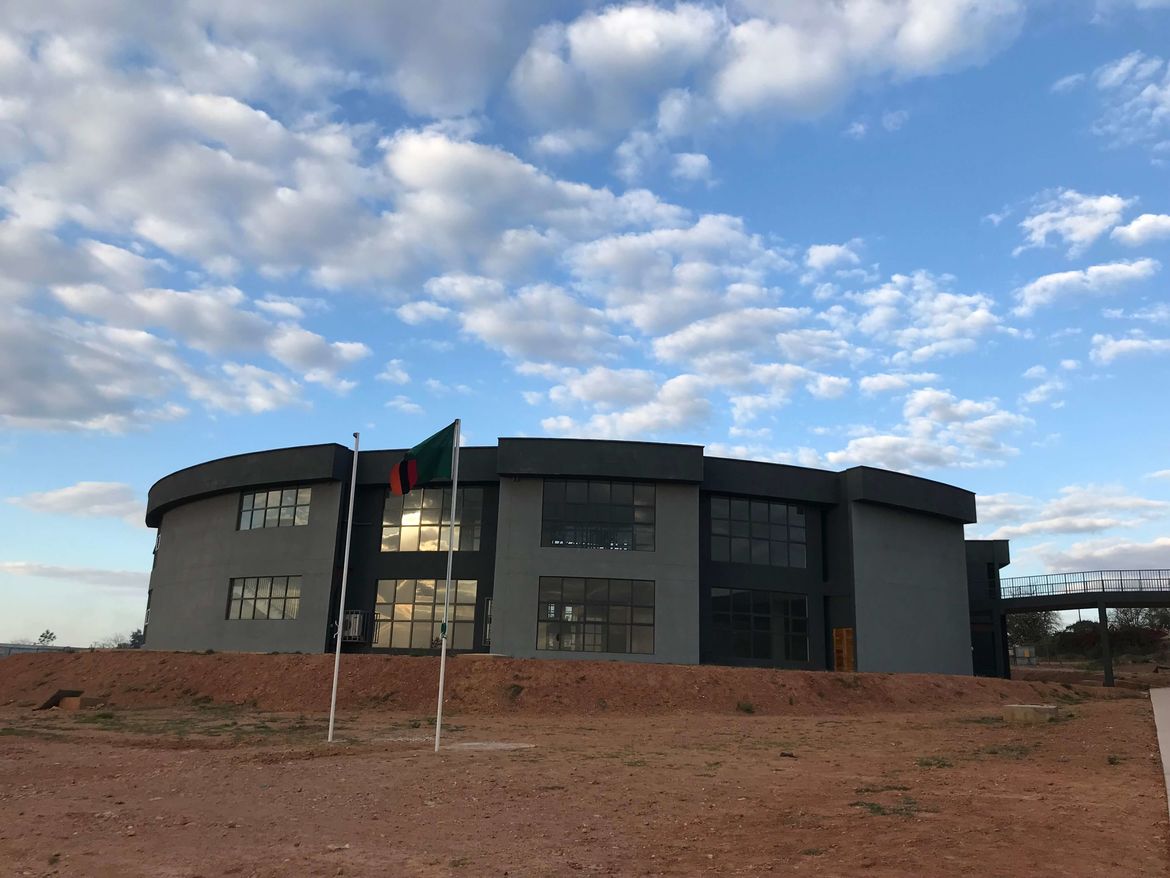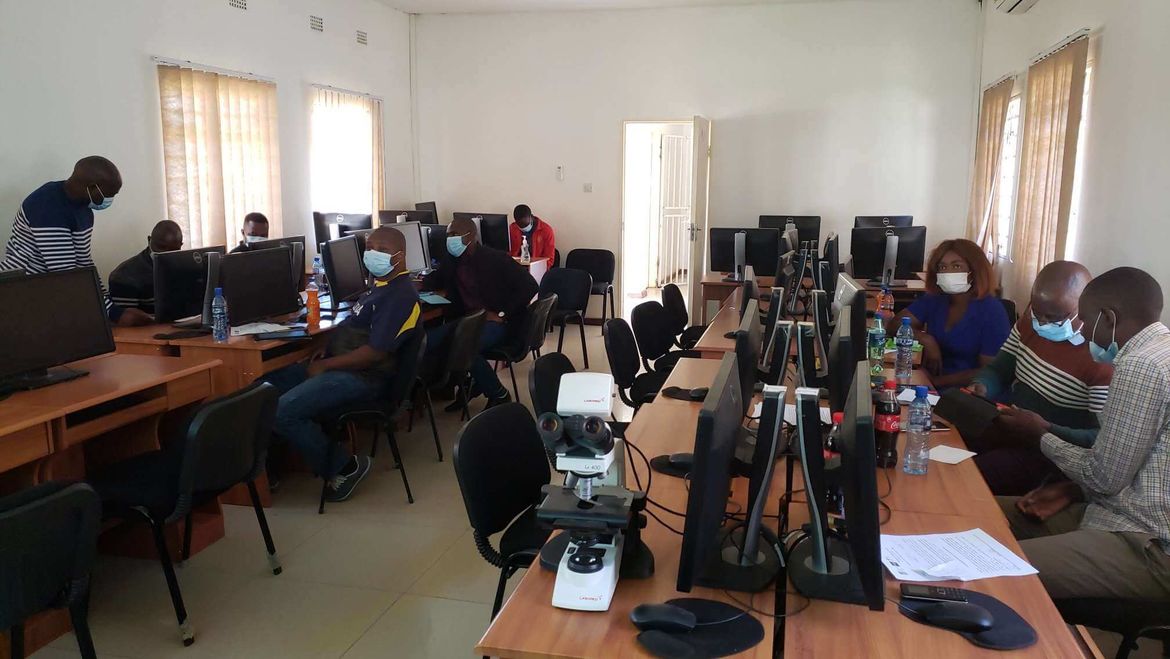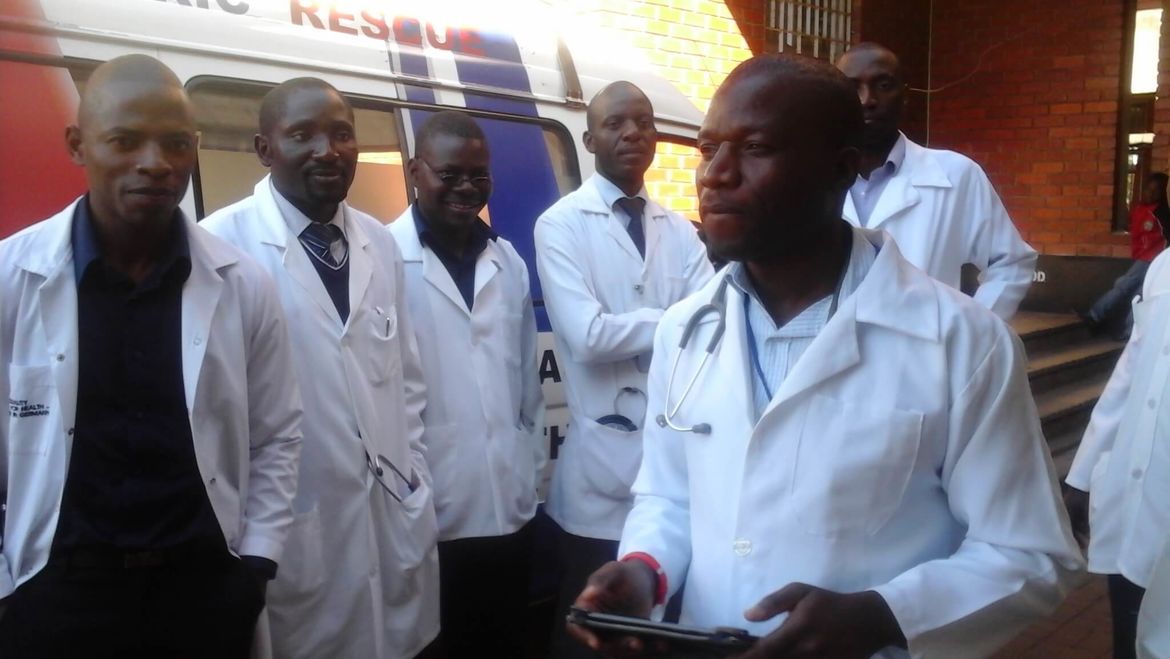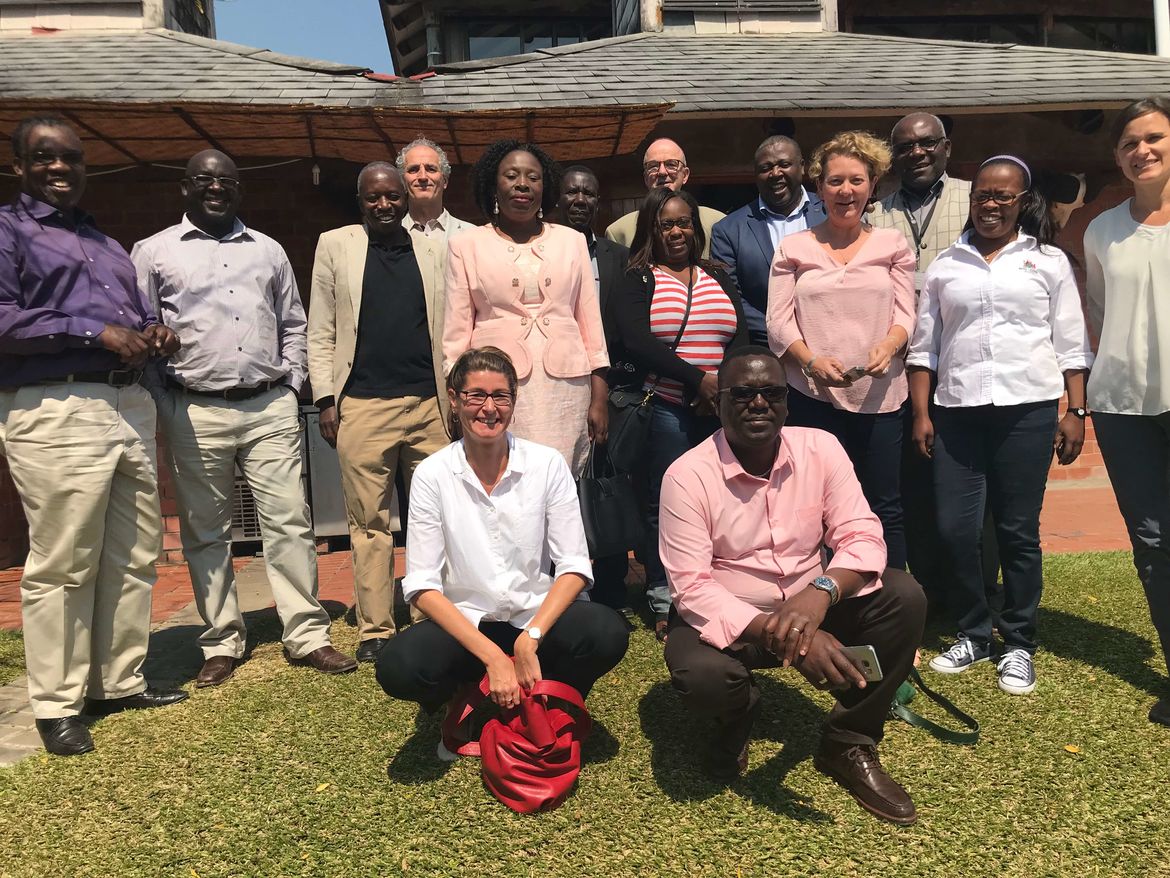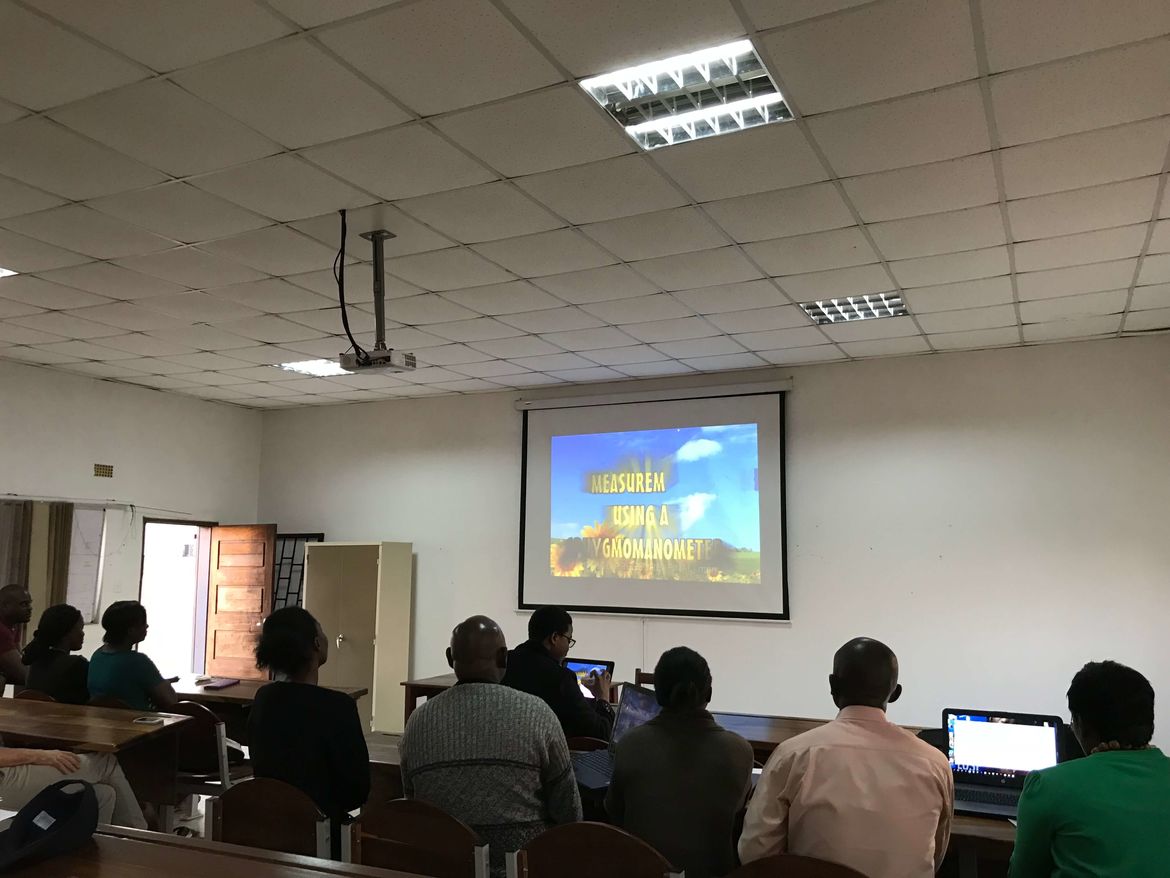Blended Learning in Zambia (BLiZ)
Project timeline: 2016 - 2022
The BLiZ medical-humanitarian project aims to support the Zambian Ministry of Health in strengthening and upscaling medical education at LMMU in Lusaka, the capital of Zambia, in response to the increased enrolment of medical students. The purpose of the project is to leverage the opportunities of blended and digital learning tools to maintain high-quality education whilst the number of enrolled students is increased. The practical implementation of interventions is supported by scientific evaluations to assess the impact, acceptance, and feasibility of the tools. We hope that our experience and findings can support and guide others in implementing digital learning tools into medical education in low-resource settings.
Local Context
Zambia faces a severe shortage of healthcare workers, particularly rural areas are severely underserved with only seven clinicians per 10,000 people (urban areas: 16/10,000 people). Although Zambia launched efforts to reduce the severe shortage of health workers such as the medical licentiate (ML) program, rural areas remain a significant challenge as they are insufficiently covered by health facilities. The recent Zambian National Health Strategic Plan (2017 – 2021) points out that at times "the situation is so severe that some facilities in rural areas have insignificant numbers of staff and in the worst scenario are managed by unqualified staff." This is where the BLiZ project comes in to strengthen the training of ML and other healthcare students to support these underserved areas. After completion of the ML training with the Bachelor of Sciences in Clinical Science, MLs take on critical responsibilities within Zambia's health system, especially in underserved, rural areas. Over 80% of MLP graduates work in rural areas, 47% of them work at district-level hospitals or level 1 hospitals, and 41% are working at lower-level health facilities, such as health centres. As a result, the Ministry of Health has set an objective of more than doubling the MLP workforce, to 600 by 2025.
To further increase the numbers of this much-needed cadre and to improve the quality of the ML training, electronic learning (e-learning) resources have great potential, especially for low-resource settings.
The overall activities revolve around four guiding components: (i) quality of teaching, (ii) quality of training, (iii) enabling environment and sustainability, and (iv) evidence generation. We conduct studies on feasibility, acceptance and methodology among students and faculty on various levels.
The specific research questions are:
- Is the technology of e-learning for medical education accepted, i.e., do faculty and students agree with the technological environment of e-learning as a mode of medical teaching and training?
- To which extent is medical e-learning used for teaching and training by faculty and students and how is medical e-learning used online and offline (context, frequency, materials)?
- Is medical e-learning improving the knowledge and skills of students, i.e. does the understanding and ability of students improve with the usage of medical e-learning in their studies?
The project is funded by the Else Kröner-Fresenius-Stiftung from 2016-2022.
e-learning
An overview of e-learning for medical education in Sub-Saharan Africa and Low-Resources settings conducted at the beginning of the project showed that whilst there is an increasing number of pilot studies, there is a lack of large-scale evaluations as well as coherence between studies using standardized evaluation frameworks. Nonetheless, with increasing internet access across Sub-Sharan Africa, e-learning tools provide a promising source to support and upscale medical education.
Initial evaluations that a digital e-learning platform that can be used offline was shown to be a feasible approach to teaching and learning among ML students with both students and lecturers reporting to be in favour of the resources.
Across all studies we are finding that uptake in everyday teaching remains a core challenge to the use of e-logbooks. Suggesting that more motivation of lecturers is needed to ensure that learning materials are a success.
VR
Virtual Reality (VR) head-mounted devices are emerging as an additional digital learning tool for healthcare students. They provide students with an opportunity to bridge the gap between theoretical clinical knowledge and clinical practice without the financial, ethical, and supervisory constraints of traditional medical learning materials such as cadavers and other skills lab equipment. At a global level, VR based learning has been found to be equally effective for knowledge and skill acquisition as traditional learning and is enjoyed by students. Although there is currently little research on the use in LMICs, we aim to test the suitability of VR in a low-resource context as a tool to alleviate pressure on supervision and extend options for clinical practice.
Study 1: In the first study we conducted a RCT among third and fourth-year BSc Clinical Science students to evaluate the effectiveness of Virtual Patients (VPs) on knowledge acquisition and acceptance of two VPs compared to learning by textbook, free internet search, and using the digital medical tool AMBOSS. In pre-and post-tests, we found a similar knowledge increase among students in the VP and textbook arms increased. Acceptance was similar across all four learning resources.
Study 2: In the second study we conducted a RCT to compare the use of VR head-mounted devices to a digital medical resource, self-directed online learning, and a book in learning about the anatomy of the stomach using pre- and post-multiple choice tests. In addition, we evaluated student satisfaction in using the tools using the Technology Acceptance Model as a framework as well as open-ended questions. Data analysis currently being conducted.
AMBOSS
AMBOSS GmbH is an innovative digital medical resource with an evidence-based, up-to-date encyclopaedia, and thousands of clinical cases, illustrations, photos and videos. It offers a solution for blended-learning implementation and can be used online as well as offline on a smartphone or tablet. In collaboration with the AMBOSS Global Health Initiative, we introduce and evaluate AMBOSS as a digital medical tool at LMMU. The overall aim of this study is to develop a deeper understanding of the drivers and challenges related to the use of digital medical resources by lecturers and students in a low-income setting and to evaluate if and how AMBOSS as a digital resource achieves its purpose in supporting the lecturers in teaching students.
e-logbook
Clinical Rotations make up a key part of training for students of all healthcare professions. During these rotations, students are typically required to keep a logbook of what procedures they have observed and assisted. The same is true for students at LMMU. Due to the decentralised training approach, students are required to attend rotations in rural areas. Previously students used paper-based logbooks to track their progress which needed to be signed off by the student and the supervisor to then be submitted to the university administration to be read into their student file.
In this project, we aim to develop and implement an electronic logbook (e-logbook) that is adapted for use in low-resource settings.
Version 1
An e-logbook based on the existing software system SurveySolutions was developed and piloted amongst ML students and their supervisors during their internal medicine rotation. The study found that the SurveySolution based e-logbook with limited adaptation to the local context was insufficient for the LMMU environment. As this was caused by design flaws rather than technology issues or rejection of the e-logbook as a quality assessment tool in and of itself, we propose that the e-logbook be re-designed in an approach to better reflect the needs of students and mentors (Barteit et al., 2022).
Version 2
To overcome the barriers identified we have developed a new tool that provides the infrastructure to set up and manage e-logbooks for different specialities (e.g. Internal medicine, surgery, …) and levels. The tool has two access points: an app and web access. The app is used by the students to track their procedures and by the supervisors to assess and feedback on the students’ procedures. The web interface can be used to manage e-logbooks and analyse usage data. Depending on the role they take members have different rights and can use the web page for different purposes. For example, staff can develop e-logbooks that can be assigned to assignments for students to complete during rotations and lecturers can view submissions and compile reports of usage analysis.
The e-logbook can be used offline, only requiring an internet connection for synchronising data (cases, feedback, and comments) upon request.
Evaluation of a pilot trial of the e-logbook within an internal medicine rotation showed that the e-logbook is highly accepted, with both students and lecturers being excited about the prospect of using an e-logbook.
For implementation, it is important to note that good prior training is necessary to ensure that students and lecturers feel and are able to use the tool. During the training, the possibilities and limitations of the e-logbook should be clearly outlined to ensure that expectations are realistic. In addition, training should include real patient examples and require students and lecturers to complete all steps of inputting cases, giving and receiving feedback and comments.
Publications
Barteit, S., Schmidt, J., Kakusa, M., Syakantu, G., Shanzi, A., Ahmed, Y., ... & Neuhann, F. (2022). Electronic logbooks (e-logbooks) for the continuous assessment of medical licentiates and their medical skill development in the low-resource context of Zambia: A mixed-methods study. Frontiers in Medicine, 3333. DOI: https://doi.org/10.3389/fmed.2022.943971
Schnieders, E., Röhr, F., Mbewe, M., Shanzi, A., Berner-Rodoreda, A., Barteit, S., ... & Neuhann, F. (2022). Real-life evaluation of an interactive versus noninteractive e-Learning module on chronic obstructive pulmonary disease for medical licentiate students in Zambia: web-based, mixed methods randomized controlled trial. JMIR Medical Education, 8(1), e34751. DOI: 10.2196/34751
Barteit S, Jahn A, Banda S, Bärnighausen T, Bowa A, Chileshe G, Guzek D, Jorge M, Luders S, Malunga G, Neuhann F (2020). E-Learning for Medical Education in Sub-Saharan Africa and Low-Resource Settings: Viewpoint. Journal of Medical Internet Research; 21(1): e12449. DOI: https://doi.org/10.2196/12449
Barteit S, Neuhann F, Bärnighausen T, Bowa A, Wolter S, Siabwanta H, Jahn A (2019). A Mobile Electronic Platform in the Low-Resource Context of Zambia for Nonphysician Clinical Students: Study on Technology Acceptance and Information System Success. Journal of Medical Internet Research; e14748. DOI: https://doi.org/10.2196/14748
Barteit S, Neuhann F, Bärnighausen T, Bowa A, Luders S, Malunga G, Chileshe G, Marimo C, Jahn A (2019). Perspectives of Nonphysician Clinical Students and Medical Lecturers on Tablet-Based Health Care Practice Support for Medical Education in Zambia, Africa: Qualitative Study. JMIR mHealth and uHealth; 7(4): e13431. DOI: https://doi.org/10.2196/13431
Barteit S, Bowa A, Jahn A, Lüders S, Malunga G, Marimo C, Wolter S, Neuhann F (2018). How self-directed e-learning contributes to medical graduate training for Medical Licentiates Practitioners in Zambia, Africa - evaluation of the pilot phase: a mixed-methods study. JMIR Medical Education; 4(2):e10222. DOI: https://doi.org/10.2196/10222
Barteit, S., A. Bowa, S. Lüders, C. Marimo, Y. Phiri, S. Wolter, F. Neuhann (2017). Implementation of Mobile Medical E-Learning for Higher Medical Education in Zambia – a Zambian-German-Swiss cooperation. Tropical Medicine & International Health; 22(S1): 115-345. DOI: https://doi.org/10.3233/978-1-61499-852-5-416
Neuhann, F. and S. Barteit (2017). Lessons learnt from the MAGNET Malawian-German HospitalPartnership: the German perspective on contributions to patient care and capacity development. BMC Globalization and Health; 13(1):50. DOI: https://doi.org/10.1186/s12992-017-0270-4
Partners

Funded by
Contact
